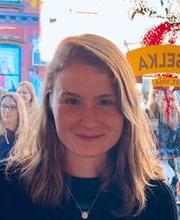Susannah Savage
Assistant Director for Oversight and Investigations at the Office of Senator Elizabeth Warren

When I entered Harvard as a freshman, I thought I would major in the biological sciences. Two Life Sciences courses later, however, it became clear that I was much more interested in the social and political implications of scientific practices than in scientific practices themselves. As a sophomore, I excitedly declared a Joint Concentration in History of Science and Studies of Women, Gender, and Sexuality, with a secondary field in Government.
By senior year, my interest in birth control, and the social meaning society ascribes to contraceptive technologies, was apparent to everyone who knew me. My thesis traced the fluid and often-contradictory narratives of “female empowerment” associated with the Reality female condom, a device first introduced to the U.S. market in 1994. In my spare time, I worked as an Advocacy Intern at the Planned Parenthood League of Massachusetts, where I advocated for comprehensive sex education and pro-choice politicians throughout the state.
Since graduation, I have been lucky enough to apply my training in historical research and gender theory to real-world policy problems. After a brief stint at an education technology non-profit, I joined a Democratic Senator’s Oversight and Investigations Team. My ability to quickly research and summarize complex topics helped me in the fast-paced world of politics, where I gained experience producing letters and reports about tax policy, banking policy, and labor policy. My portfolio has since expanded to include health policy (with a focus on reproductive health), government ethics, and media policy. I also had the opportunity, in the wake of the #MeToo movement, to write legislation addressing workplace sexual harassment.
My training in intersectional feminist theory has undeniably made me a smarter, defter, and more effective Senate staffer. The concepts I was exposed to as a WGS concentrator remind me, every day, to examine how U.S. laws and regulations differentially impact communities and populations around the world. I also credit my WGS degree with teaching me a critical lesson—one that more policymakers should learn: to always acknowledge the limits of my own understanding, and to seek out those whose standpoints provide a different view of the world than my own, before asserting the universality of my ideas and viewpoints.
The U.S. Senate has been a fascinating vantage point to observe the rising popularity of feminist theory in American popular culture. I have been amused and thrilled, since the 2016 presidential election, to watch my family and friends become fluent in the language of “intersectionality,” “whiteness,” and “reproductive justice”—leading to conversations that never would have occurred when I graduated college in 2015. The surge of interest in feminism is exciting and makes me hopeful for a future when no student asks, “What can I do with a WGS degree?” before diving straight in.